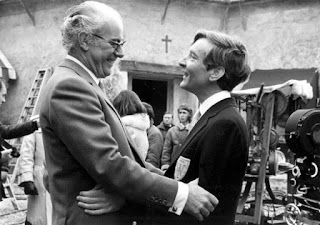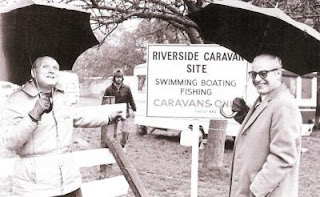However while I must respect the man who brought my favourite comedy film actors to the big screen, he was first and foremost a businessman. And a very shrewd one at that. His business acumen and eye for the next subject or the perfect actor for his team also came at a cost. Yes, money. For while the Carry On films were incredibly successful, making stars of many brilliant actors, these actors sadly did not receive the monetary reward most would argue they were due.
While the regular team of actors were pretty much guaranteed two feature films a year, made at specific times which allowed them to take on other work commitments, the pay was excruciatingly low. Ok, perhaps they were earning more than the average man or woman on the street, but considering there were never any repeat fees, they got a pretty raw deal. Peter Rogers often argued that it was up to the agents representing the artists to carve them a bigger slice of the action and that's possibly true. Yet there are also stories of actors asking for more money and never appearing in a Carry On film again.
While repeat viewings on television could not have been imagined during the peak period of Carry On production, there should surely have been something written into the actors' contracts to take the possibility into account. Kenneth Williams made frequent reference in his diaries to how wealthy both Peter Rogers and Gerald Thomas became as a result of their producer/director partnership and while to a certain extent we say good for them, it must have been galling for the stars that helped create such enduring success.
Two things in particular really get under my skin on this subject. One is that we hear stories of how legendary performers like Charles Hawtrey and Joan Sims ended their lives in relative poverty and in pretty sad states. Without probing public figures' private finances, this just isn't on. The oft repeated story of Joan plucking up the courage to write to Rogers for a loan makes me angry and the anger doesn't dissipate each time I hear the tale.
It also irks that the women were always (with the exception of guest star Elke Sommer) paid significantly less than the men. While Sid and Kenneth received £5000 or thereabouts per picture, the likes of Joan and Hattie were lucky to receive half that amount. Was their contribution half as important? Did they make less of an impact than the men? Most certainly not. It's nothing short of outrageous.
Anyway, I'm drifting off subject. Strangely, whenever I heard Peter Rogers interviewed about the Carry Ons, I often felt he came across as being pretty monosyllabic. He was never the colourful character on camera that you would expect to be behind such a set of colourful, wonderful films. That's just my take anyway. Despite these rather uncomfortable issues, there is no doubt that without Mr Carry On himself, there would not have been these amazing, hilarious British films we all hold so dear.
Clicking on the adverts helps to keep this blog going




No comments:
Post a Comment